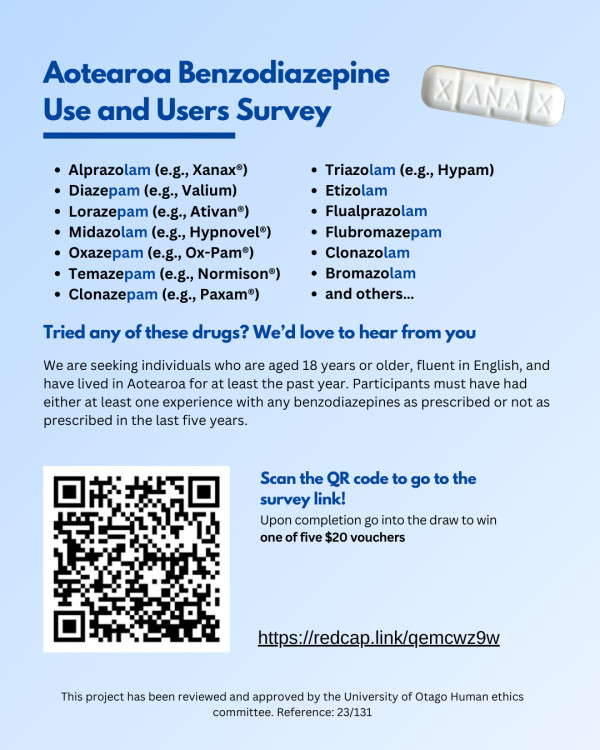
Caitlin Toohey, a neuroscience master’s student at the University of Otago, is delving into the experiences of New Zealanders who use one of the most widely prescribed drugs globally: benzodiazepines.
Benzodiazepines, commonly known as benzos, are a class of depressant drugs usually prescribed for anxiety and insomnia. They’re also used to treat muscle spasms, seizures, and withdrawal from alcohol.
In New Zealand, some of the most prescribed benzos include alprazolam (e.g. Xanax), diazepam (e.g. Valium), and lorazepam – but benzos are also sold on the black market. If you’re taking illicit benzos, there’s no guarantee that they’re the benzo they’re sold as, or even that they’re a benzo at all. Read more about recent findings of a potent opioid sold as benzodiazepines.
Benzos can make people who use them feel relaxed, sleepy and sedated. Some people might also feel disorientated, dizzy, anxious and depressed.
Toohey was inspired to explore this topic after grappling with anxiety and having her doctor recommend benzos. Her first-hand experience ignited her curiosity to learn more about the drug and its usage patterns in New Zealand.
Caitlin Toohey, benzodiazepine researcher
Why study benzos?
Toohey realised there were major gaps in current research about benzos, particularly when it comes to users’ experiences, whether they’re using prescribed or illicit benzos.
“There’s been a lack of study into the harms associated with the prescribed use of benzos, and minimal research into people’s experiences of benzo withdrawal."
- Caitlin Toohey, researcher
Withdrawal symptoms can happen when someone stops or cuts down their use of benzos.
Toohey says that studies have also failed to investigate the effects of benzodiazepines in females, even though benzos are mostly prescribed to women. She believes this highlights the need for more comprehensive data collection and analysis.
Medical guidelines generally recommend that benzos are only used for a short period of time (four weeks), however international research shows that many patients take them for longer. Toohey says Kiwi doctors have limited awareness of how their patients are using benzos and what patients expect from them in terms of support and guidance.
Toohey is also interested in how many people are using benzos that aren’t prescribed to them, as well as details like dosage, what type of benzos are common, and what other substances New Zealanders use alongside benzos.
The focus of this New Zealand research into benzos
Through an online survey, Toohey’s research will explore benzo use and misuse in Aotearoa. She is focused on harms of prescribed use, why people take benzos illicitly and what, if any, harms they experience. Toohey is also interested in understanding if there are different usage patterns between groups who obtain it legally and those who get their benzos illicitly.
Toohey hopes the findings of her research could help improve doctors’ understanding of prescribing benzodiazepines, including how patients feel about their experience with the drugs. She also aims to help people be safer if they’re using benzos that aren’t prescribed to them.
“I want the findings of this study to create well targeted harm reduction campaigns for people who are using benzodiazepines outside of prescribed use."
- Caitlin Toohey, researcher
A brief history of benzodiazepine research
Toohey says there when benzos first came onto the market in the 1950s-70s, there was a lack of thorough investigation into these new drugs.
“Around this time, mental distress was perceived to be a ‘burden’ to society and there was a great economic drive for pharmaceutical companies to produce a drug which could help alleviate symptoms of mental distress,” she says.
The emphasis on profits could have led to drug companies overestimating the effectiveness of benzos, and underestimating the long-term negative effects, withdrawal symptoms and side effects.
It wasn't until the 1980s that research began to document the abuse and misuse of benzos. However, by then, millions of prescriptions had already been issued, and these drugs had become deeply ingrained in both society and medicine.
What do New Zealand doctors think of benzos?
A study found that 49% of the NZ doctors interviewed were worried about misuse of benzos, a higher percentage than were worried about opioids. Prescription benzodiazepines are also the most common prescription medicine involved in overdose deaths in New Zealand. In 2020, 25 overdose deaths were associated with benzodiazepine use.
International research shows that many individuals who use illicit benzodiazepines were initially introduced to the drugs through a prescription. Some individuals may use prescription benzodiazepines for their therapeutic effects but take higher doses or use them more often than prescribed.
Toohey says it’s crucial to understand if there is a relationship between how individuals use prescription benzos and the likelihood of future misuse.
Interested in being a part of this study?
Toohey is currently recruiting participants to complete a 15-minute anonymous survey.
To be eligible you must:
- Be aged 18+
- Have lived in NZ for at least the past year
- Have had at least one experience with any benzo, prescribed or illicit, in the past 5 years
Survey participants will go into the draw to win one of five $20 vouchers.
Toohey expects to complete her studies in February 2025 with the results being published in March 2025.
Head to the study website to learn more and to sign up.
Contact Caitlin Toohey via email if you have any questions about the study: tooca294@student.otago.ac.nz
Related stories
Recent stories
What is tusi (pink cocaine)?
It's pink, but it isn't cocaine or 2C-B. Here's what you need to know about tusi or pink cocaine.
What to do if your drink has been spiked
Here's what to do and support services you can contact if you think your drink has been spiked.
What is opioid substitution treatment?
Opioid substitution treatment is where people who are addicted to opioids (like heroin or morphine) can get a safer medicine instead.
